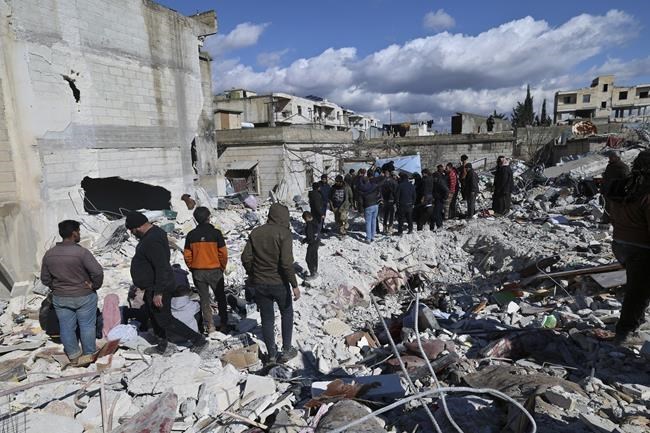TORONTO — Aya Hammoud has been struggling to cope after seven members of her family were killed in the earthquake that has devastated parts of Syria and Turkey.
The Toronto resident said her grandfather, his wife, her four cousins and their mother died when the quake destroyed their apartment building in the Syrian city of Harem, near the country's border with Turkey.
Hammoud, who came to Canada as a refugee in 2017, said the last few days have been "really, really hard."
"I don't know what coping is at this moment," the 24-year-old said in a phone interview. "I'm feeling this much sadness and despair ... Most of my family died."
Hammoud said rescue teams recovered the bodies of her grandfather and his wife on Wednesday, and the bodies of her cousins – all children – and their mother were pulled from the rubble on Thursday.
"The eldest kid is 13 years old. Her name is Haya. She's a very smart girl. She is special. She did not deserve to be under the (rubble) for three days," Hammoud said. "And also her siblings, Sarah, Qusay and Oday."
The deaths came after her grandmother and uncle were killed in a bombing in Syria's ongoing war several years ago, Hammoud added.
Another aunt and her children who lived nearby managed to escape their home when the quake hit, said Hammoud, as did her mother and siblings who live in a different city.
"My aunt kept telling me like how bad it is," Hammoud said. "She called it the end of the world. It's a catastrophe."
Local rescue teams prioritized trying to pull survivors from destroyed buildings where they could hear voices under the rubble, Hammoud said, a situation that left her wondering if more could have been done to save her family.
"They were only going after the places that they know 100 per cent there's somebody there alive," she said. "I cannot help but think if (my cousins) were pulled out earlier maybe they would have been alive."
Hammoud said she was trying to channel her grief into efforts to urge people to donate to earthquake relief efforts.
"This is my only coping way for now," she said.
Monday's 7.8 magnitude earthquake, followed by several powerful aftershocks, ravaged parts of southeastern Turkey and northwest Syria, killing more than 20,000 people and destroying thousands of buildings.
Abdulfatah Sabouni, who lives in Calgary with his wife and four children after the family arrived as Syrian refugees in 2016, was on a business trip in the Turkish city of Gaziantep when the quake hit while he was asleep in his hotel.
"After about a minute, I thought I should leave the building," he said in a phone interview from Turkey. "Everyone was outside, including children. It was extremely cold and snowing."
Sabouni, 46, said he saw that a nearby building had collapsed and his hotel was soon shut down, forcing him to take shelter in a car with a friend for the last few days.
"We drive the car to open areas where there are no building around," he said. "Ongoing aftershocks are not stopping. They are causing more buildings to fall since Monday."
Leaving the city has been difficult, he said, because people are crowding in the airport and transit hubs in an effort to flee.
"People are living on the streets. Many are sick or injured," he said. "Many people lost contact with their family members."
In Syria, which includes government-held and rebel-held areas after more than a decade of war, more than 3,100 had been reported dead and more than 5,000 injured as of Thursday.
The repercussions of the war have made the country more fragile with destroyed infrastructure and lack of access to basics including power, fuel and medical supplies.
About 6.9 million people were internally displaced inside Syria before the earthquake and more than 6.8 million Syrians have been forced to flee their country since 2011, including 3.6 million in Turkey alone, according to the United Nations.
Marwa Khobieh, executive director of the Syrian Canadian Foundation, said many of those who were killed, injured or displaced due to the earthquake in southeast Turkey are Syrian refugees who have been living there.
"These people are going from one crisis to another," she said. "They had to flee their homes because of security reasons and the bombing that was happening."
She said Syrian Canadians have been worried about their loved ones in Syria and Turkey.
"It was really tough on almost every Syrian who lives in Canada," she said of the earthquake. "It was shocking."
The first UN aid trucks to enter the rebel-controlled area in northwest Syria from Turkey arrived on Thursday, underscoring the difficulty of getting help to people in the country.
Most of those who are displaced in Syria live in terrible conditions that have been exacerbated by the earthquake, Khobieh said.
"Many health facilities in war-torn areas were only partially functional or not functional at all," she said. "This situation is prior to the earthquake, so you can imagine (the situation) after this natural disaster impacted the most vulnerable people."
This report by The Canadian Press was first published Feb. 9, 2023.
Maan Alhmidi, The Canadian Press

